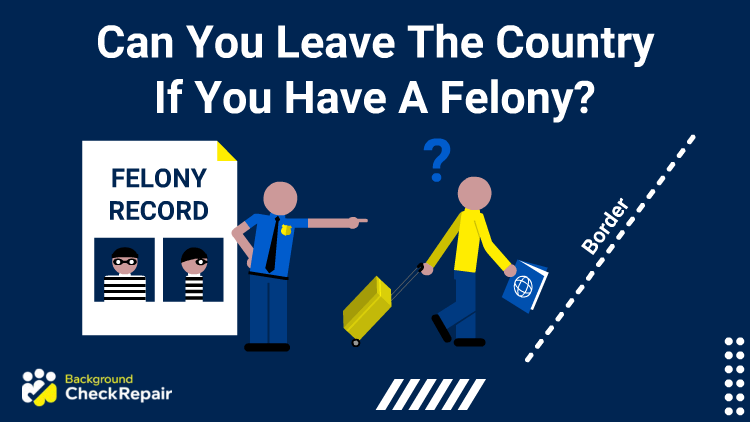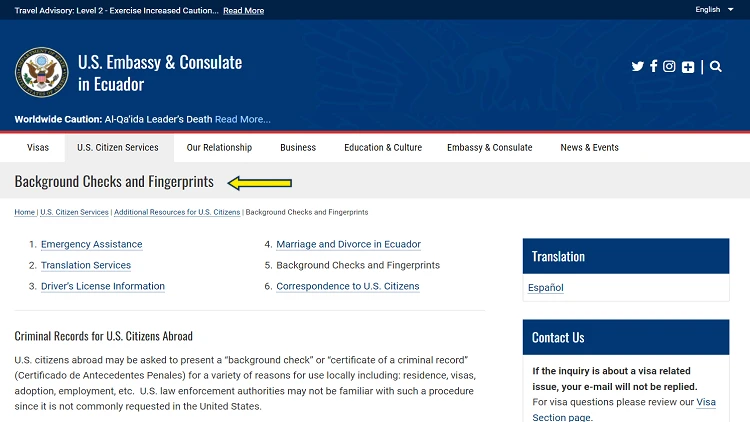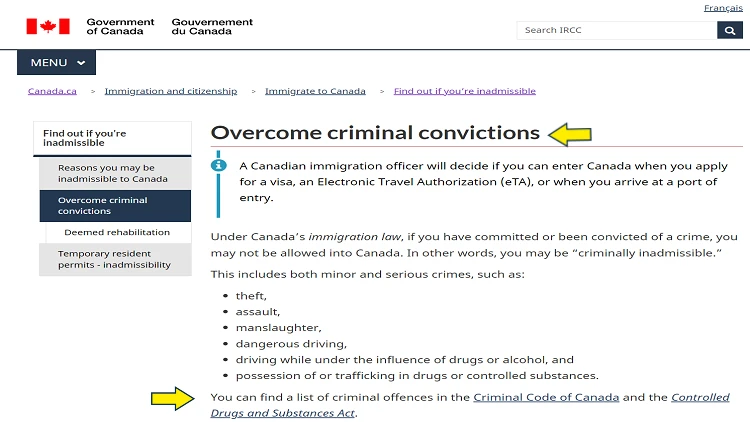
Anyone wishing to travel outside the US may wonder, can you leave the country if you have a felony or can you leave the country if you are on probation or have a warrant?
The truth of the matter is that a convicted felon is likely to face travel restrictions; however, this is not always the case. If a person has served their sentence, they are allowed into some specific countries as long as they have a valid passport.
A few countries out there explicitly prohibit anyone with a felony from entering.
This comprehensive guide answers the question, can you leave the country if you have a felony, and provides information about traveling internationally with a criminal record.
Can You Leave the Country on Felony Probation?
The concerned authorities consider several factors to determine if a convicted felon is allowed to leave the country. The three main factors include:
- Has the felon served his sentence?
- What is the type of crime on their record?
- Does the government in question impose any travel restrictions?
In any case, convicted felons will have to serve their sentence before they are allowed to travel. If an offender receives a fine or is sentenced to a probation period, their movements will be restricted.1 These restrictions vary depending on the probation conditions set by the judge, which vary according to the nature of the crime.
For example, suppose one of the conditions of probation is that the felon needs to report to a probation officer after a certain period. In that case, the felon will not be allowed to travel to another state or abroad at the time of the meeting. The felon will require the permission of the probation officer to travel.
Restrictions will ease if the conditions of the probation period have been fulfilled. Once the terms are met you can leave the country if you have a felony.
Felony Travel Restrictions (Can You Leave the Country if You Have a Felony?)
Can you leave the country if you have a felony? If a felon has completed their sentence, whether the court-imposed parole, imprisonment, probation or whatever, then they are allowed to travel freely. First, they will need to obtain a valid US passport which depends on the person’s current financial status and the conviction type they served.
It is easier to travel with a valid passport.8 A felon who has served their sentence will not encounter any problems moving around the country, but they may face a few issues when traveling internationally. A passport is an identification form that allows a person back into the US but does not guarantee entry to other countries.
Some countries ban felons with serious criminal records.
Additionally, a few countries require visas alongside passports from US citizens before they are allowed to enter the country. Though it’s easy to obtain a passport, getting a visa with a felony can be pretty challenging.
What Felonies Disqualify You From Getting a Passport?
Generally, the state department will approve the passport of anyone who has fulfilled the terms of their statements.
However, certain things can disqualify a US citizen from getting a passport, not just a felon. These include:
Felony Drug Convictions
The main disqualifier from obtaining a passport in the US is an international drug trafficking charge. A person is ineligible for a passport if they commit a drug trafficking crime while crossing borders.2 However, getting caught with drug possession in the US is usually categorized as a felony arrest.
Once the felon has served their sentence, they will get their passport reinstated, especially if this was a first-time offense.
Felonies on Probation
The State Department may deny a passport application if a person is on probation or is currently under felony arrest. If the courts decide that the party is a flight risk, their application will be denied.
Moreover, the government will deny a passport application to anyone deemed a national security threat.
Owing Child Support Money
Though this is not a crime, child support debt may preclude an interested party from obtaining a passport.
The rule is very clear; the State Department prevents anyone who owes $2500 or more in child support.7
Unpaid Federal Taxes
Anyone with a high amount of delinquent tax debt may be prevented from obtaining a passport. The IRS could refer the party’s case to the State Department, which will revoke the current passport or deny a passport renewal.
In this case, delinquent tax debt refers to more than $55,000 in taxes.
Unpaid Federal Loans
A few types of delinquent federal loans may disqualify an applicant from obtaining a person (this does not include outstanding student debt). In most cases, federal assistance loans for medical emergencies, repatriation expenses when abroad, and many more will automatically disqualify an applicant.
Strict Age Requirements
Even though passport applications have restricted age requirements, specific guidelines apply to minors under 16, such as parental awareness.
What Countries Can You Travel To With a Felony?
Anyone preparing to immigrate or visit another country may have to apply for a visa. A visa refers to a document usually stamped on a passport, which allows a person into a particular sovereign country.
Visa application varies according to country, and some will not allow anyone with a felony on their records to get a visa. Additionally, each country has its own regulations on what constitutes a felony which affects the denial or granting of a visa.
Countries that deny anyone with a felony on their record include:6
- United Kingdom
- Taiwan
- South Africa
- New Zealand
- Macau
- Kenya
- Japan
- Israel
- Iran
- India
- Cuba
- China
- Canada
- Australia
- Argentina
European Countries That Allow Felons
The US is among the few countries that have stringent policies against felony entry. On the other hand, Europe, especially the Schengen Area, has lax policies when granting permission to admit someone with a criminal record. Generally, convicted felons with more minor crimes are allowed entry to these countries, provided their crimes are not too serious.
The countries in the Schengen Area have abolished visas, passports, and other border control regulations within their mutual borders and function as a single jurisdiction for international travel. In short, they have a similar visa policy. These Countries include:
- Poland
- Norway
- Netherlands
- Denmark
- Lithuania
- Germany
- France
- Finland
- Island
- Italy
- Greece
- Hungary
- Portugal
- Liechtenstein
- Estonia
- Belgium
- Austria
- Czech Republic
- Luxembourg
- Malta
- Latvia
- Slovakia
- Spain
- Slovenia
- Sweden
- Switzerland
Getting an International Background Check
Checking background across international borders is a very complex and challenging process. This is because each country has its own regulations, and some even prevent foreign agencies from getting these records. As such, some international background checks may take weeks to complete.
Most customs offices will request certificates of good conduct or a document indicating a lack of criminal history.

The Ecuadorian consulate provides online access to a number of vital records and information on how to complete background checks and fingerprints for international background checks.
Even so, most international customs run standard international background checks to verify a person’s criminal history. Most countries have varying regulations on the types of criminal records available, and some have restricted access. The United States is not among these countries; criminal records are open to the public and, in general, are free of restrictions.
A person with a violent criminal record may not be allowed entry into another country.
Do Countries Share Criminal Records? (Can You Leave the Country if You Have a Felony?)
The short answer is no. There is no single standard system that shares individual criminal information among nations. Additionally, some countries restrict foreign entities from acquiring a person’s criminal information.
Each country has its own regulation that handles criminal records.
That being said, several groups of countries have come together to share such information. For example, INTERPOL keeps track of international criminal records in its database,5 which all the participating countries can access. The European Criminal Records Information System (ECRIS) also shares criminal conviction information among member states.4
How Does Canada Know if You Have a Felony? (Can a Felon Travel to Canada?)
Canada is among the countries that have strict immigration laws. However, unlike the US, Canada does not have terms such as ‘misdemeanor’ or ‘felonies.’ The authorities categorize crime into three:
Summary Offenses
These are minor offenses or the least serious crimes. The maximum possible penalty they can carry is a $5000 fine or a jail time of 6 months. These offenses do not require a jury trial. They include but are not limited to
- Disorderly conduct
- Soliciting a prostitute
- 30 grams or more of Marijuana possession
- Indecent exposure
- Contempt of court
Most states label these crimes as simple misdemeanors and will not prevent a US citizen from crossing the Canadian border. Anyone convicted of two or more summary offenses in the United States will be barred from entering Canada.
Indictable Offenses
In Canada, these are considered the most severe crimes. They have varying penalties, which range from 10 years to life imprisonment. Indictable offenses are categorized as class A or B felonies in most states in the US, such as Washington.
They carry a ten-year prison sentence to life imprisonment.
A few class C felonies that carry a maximum 5-year prison sentence in Washington are also categorized as indictable offenses in Canada. Anyone with a felony considered an indictable offense in Canada would be barred from entry. Indictable crimes include but are not limited to:
- Murder
- Manslaughter
- Robbery
- Motor Vehicle Homicide
- Kidnapping
- Arson
- Aggravated assault
- Drug trafficking
- Aggravated sexual assault
- Perjury
Hybrid Offenses
These can either be indictable or summary offenses, depending on the nature of the crime. They have a penalty of between 2 to 14 years. Examples include
- Hit and run
- DUI
- Drug possession
- Assault offenses
- Harassment
- Theft crimes
- Identity theft

Criminally inadmissible in Canada applies to anyone who has been convicted of serious crimes.
According to the Canadian Immigration and Refugee Protection Act (IRPA), anyone with a serious offense should be barred from entry or be criminally inadmissible. Canada has full access to US criminal records and can review a visitor’s record before entry.
How To Check if You Have a Felony for Free
To prevent any mishaps when traveling internationally, the first step a potential traveler should take is to conduct a no-cost examination of criminal background on themselves to determine whether felonies, if any, are part of the details visible in a background investigation. If felonies appear on the person’s record, they can consider getting them sealed or expunged.
Anyone who has had contact with law enforcement officers or committed a crime or infraction may have a criminal record.3 This depends on the nature of the crime, state laws, and the age of the criminal. An interested party can obtain their criminal records by submitting a request to certain government agencies such as local law enforcement offices, FBI agencies, and court clerks.
Additionally, several third-party websites also offer criminal record searches for interested parties. This information can be obtained online, in-person or by mail.
Can You Leave the Country With a Felony Warrant?
Can you leave the country if you have a felony warrant? Traveling with a warrant is a lot more complicated than traveling with a felony. Sometimes, a US citizen will not be allowed to travel across states with a warrant. It’s almost impossible to leave the country with a warrant.
This is because most security borders for international flights will check for any outstanding warrants.
Local law enforcement can access information on criminals using a national database which will allow them to obtain a person’s criminal record, including a warrant status. If a person has an active warrant for arrest, they will be taken into custody. Any of the following will not be allowed to leave the country:
- International drug trafficking charges
- Anyone subjected to a federal arrest
- Anyone prohibited by parole, a court order or probation from leaving the country
- Owning child support
- Anyone yet to serve their prison sentence
- Anyone under a supervised release program, especially if it pertains to drug-related charges
When anyone decides to travel internationally, most customs will check their databases, and anyone with a warrant may be denied a visa which is a requirement for entering a country. Besides the airline security database, some customs offices involve other additional security checks.
It’s advisable not to travel away from the country if a warrant issue is not resolved, especially if the party has an active warrant or is undergoing trial. Anyone with a valid passport will have it confiscated if they try to travel after a warrant has been issued. After an arrest and court appearance, judges may order that the person refrains from leaving the country or traveling out of state until the case is heard.
Will Criminal Record Affect Visa Application?
A criminal record will definitely affect a person’s visa application. Moreover, if a person commits a crime while holding a visa, their visa may get canceled, and the person may get deported. In most countries, a person will not be eligible for a visa if they have a substantial criminal record. You can leave the country if you have a felony as long as the country in question provides you with a visa.
All countries require a person to declare any criminal history when applying for a visa. Most immigration departments will require a police certificate and a statutory character declaration. Once a person commits a substantial crime and their visa gets canceled, they are considered unlawful non-citizens.
To summarize, anyone with a felony can leave the country if they have a passport and a visa (if necessary) for the country they wish to travel to, so the answer to the question, can you leave the country if you have a felony, is yes, if you can obtain the travel documents.
Frequently Asked Questions on Can You Leave a Country if You Have a Felony




